Locking Up Children Without Possibility For Release Is Unconstitutional, Says ACLU
ACLU Release Nov. 17, 2010
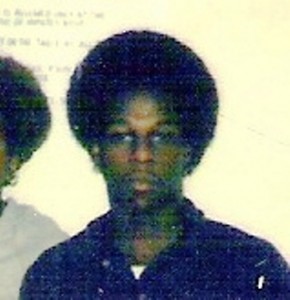
Henry Hill of Saginaw was 16 when sentenced to LWOP for first-degree murder for “aiding and abetting”a killing by firing his gun into the air. Now 45, he has legal research and cooking certificates, and is lead cook.

Bosie Smith-El of Ypsilanti was sentenced in 1992 for murder although he claimed self-defense due to his small stature. He has earned numerous vocational certifications.
DETROIT, MI – The American Civil Liberties Union and the ACLU of Michigan today filed a lawsuit on behalf of nine Michigan citizens who were sentenced to life in prison without the possibility of parole for crimes committed when they were minors. The lawsuit charges that a Michigan sentencing scheme that denies the now-adult plaintiffs an opportunity for parole and a fair hearing to demonstrate their growth, maturity and rehabilitation constitutes cruel and unusual punishment and violates their constitutional rights.
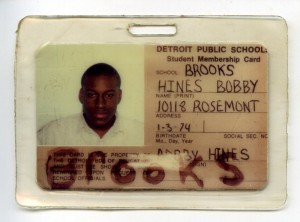
Bobby Hines of Detroit was 15 in 1989 when sentenced for felony murder although he was not the shooter. He had earned good grades, and has since earned his GED and vocational certificates in prison.
“These life without parole sentences ignore the very real differences between children and adults, abandoning the concepts of redemption and second chances,” said Deborah Labelle, attorney for the ACLU of Michigan’s Juvenile Life Without Parole Initiative. “As a society, we believe children do not have the capacity to handle adult responsibilities, so we don’t allow them to use alcohol, join the Army, serve on a jury or vote – yet we sentence them to the harshest punishment we have in this state – to die in adult prisons.”
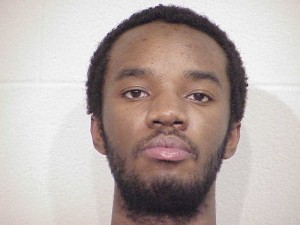
Keith Maxey was 16 when he was shot four times during a drug house robbery in which a man was killed. He had no previous record.

Damion Todd of Detroit went to prison as a result of a teenage gun fight in which he and his friends were fired upon by another group. He was captain of his football team and active in his church.
Michigan law requires that children as young as 14 who are charged with certain felonies be tried as adults and, if convicted, sentenced without judicial discretion to life without parole. Judges and juries are not allowed to take into account the fact that children bear less responsibility for their actions and have a greater capacity for change, growth and rehabilitation than adults.
The U.S. is the only country in the world that sentences youth to life without parole, and Michigan incarcerates the second highest number of people serving life sentences without parole for crimes committed when they were 17 years old or younger. Currently, there are 350 individuals serving such mandatory life sentences in Michigan. This includes more than 100 individuals who were sentenced to life without parole who were present or committed a felony when a homicide was committed by someone else.

Kevin Boyd was 16 when he gave his mother his father’s house keys. His mother killed his father. Boyd mentors other youths in prison, along with writing and playing music.

Jamal Tipton was 17 in 1987 when he participated in a robbery with two adults that resulted in the death of the victim. He has obtained his GED and currently works as an electrician, and mentors younger prisoners.
“Sentencing children to spend the rest of their lives in prison without giving them some opportunity for parole is unfair, unconstitutional and un-American, and it completely ignores the human potential – especially in children – for rehabilitation,” said Steven Watt, staff attorney with the ACLU Human Rights Program. “In America, we should not be locking children up and throwing away the key without affording them a second chance.”
The ACLU’s complaint asks the court to declare that denying children a meaningful opportunity for parole violates the U.S. Constitution’s Eighth Amendment protection against cruel and unusual punishment and Fourteenth Amendment right to due process. It also alleges violations of the plaintiffs’ rights under international law and treaties.
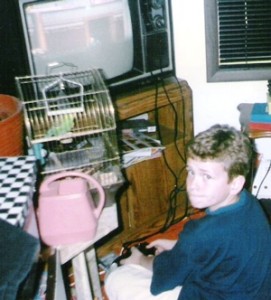
Matthew Bentley was 14 in 1998 when he killed a man during a B & E. If he had committed the crime two years earlier, he would have been sentenced to rehabilitative incarceration as a juvenile.
Michigan’s laws run afoul of the U.S. Supreme Court’s admonitions that children must be treated differently in our criminal justice system. In May, the Court ruled in Graham v. Florida that it is cruel and unusual punishment to sentence juvenile offenders who did not commit homicide to life in prison without any chance of parole. In 2005, the Court ruled similarly in Roper v. Simmons that executing juvenile offenders is unconstitutional. Both decisions recognized that juveniles bear less responsibility for their actions than adults and have a greater capacity for change, growth and rehabilitation, and that children should not be punished with the harshest sentence that can be imposed on adults.
Last year, the Michigan House Judiciary Committee held hearings to address a package of bills (HB 4518, 4594, 4595 and 4596) that would prohibit the mandatory sentencing of juveniles to life in prison without the possibility of parole. In 2008, a previous package of bills passed the State House, but stalled in the State Senate. The ACLU of Michigan has worked with legislators to repeal these harsh sentences since 2003.
The lawsuit was filed in the U.S. District Court for the Eastern District of Michigan against Jennifer Granholm, Governor of Michigan, Patricia Caruso, Director of the Michigan Department of Corrections and Barbara Sampson, Chair of the Michigan Parole Board. In addition to LaBelle and Watt, the plaintiffs are represented by Vanita Gupta, Robin Dahlberg, Dennis Parker and Jay Rorty of the national ACLU, Michael J. Steinberg, Dan Korobkin and Kary L. Moss of the ACLU of Michigan and Ronald Reosti.
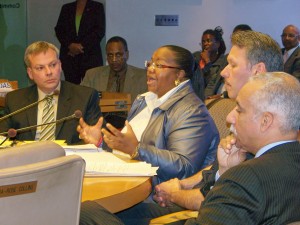
Kym Worthy asks City Council for funds for county crime lab in 2009; current Council granted over $1.2 million
Ed. note: The complaint reads in part “Plaintiffs seek a declaration that Michigan laws, policies and practices, including M.C.L 791.234, insofar as it excludes Plaintiffs from the jurisdiction of the Michigan Parole Board and thereby denies them a meaningful opportunity for release, violates the Eighth and Fourteenth Amendments of the United States Constitution and customary international law.
Plaintiffs do not challenge their judgments of conviction and do not seek to invalidate their life sentences; rather Plaintiffs seek orders that the Michigan Department of Corrections afford them, as persons sentenced to life imprisonment for offenses committed before they were eighteen years old, a meaningful opportunity to obtain release based on their demonstrated maturity and rehabilitation.”
Wayne County Prosecutor Kym Worthy testified against bills that would have outlawed the practice of sentencing juveniles to die in prison, during House legislative committee sessions. She had her assistant prosecutors play the video of three teens beating a man to death in a Coney Island, as if that typified youths in Detroit.
She is currently fighting attempts by Davontae Sanford, who was 14 when he was coerced into confessing to killing four people in a drug house, to overturn his guilty plea. Another prisoner, Vincent Smothers, has confessed to the killings, and Detroit’s retired chief of homicide William Rice has testified that Davontae was with him, not at the site of the crime, when the killings occurred.
Read the ACLU complaint in Hill et al. v. Granholm here.
Read profiles of clients here.
Read “Second Chances,” a publication of the ACLU of Michigan highlighting the issue of JLWOP here.


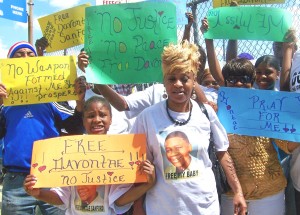




I support this endeavor 100000% but one must look at the staggering numbers of Juveniles who were sentenced and eligible for parole under the contex of what a paroleable life was intended 20 years ago. 16 year olds who are still waiting and approaching the age of 40, were led to believe –10 years you will be eligible for parole, most were led to believe then that they could be out in under 15 providing they were on the right track. Very few judges intended for a paroleable life sentence to last longer than 15 or even 20 years, otherwise they wouldve sentenced them to 20 years-they left these kids hope, and someone lied. The “new life sentence theory” Life is Life so one can be handed a paroleable life sentence and still never be released.
This is definitely a start but it cannot end here.